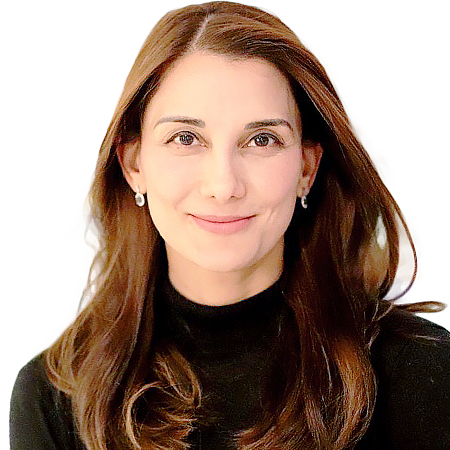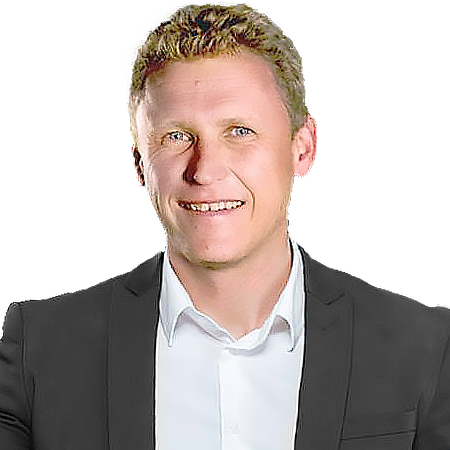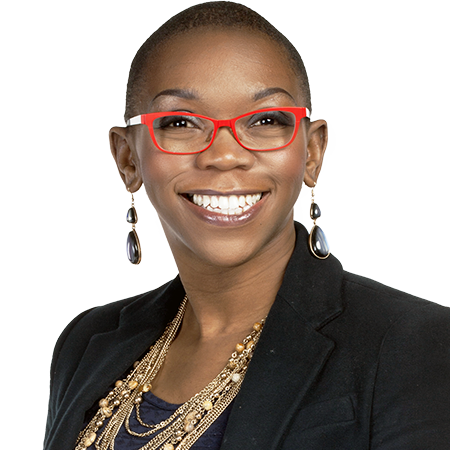Let's dig in...
In recognition of SA Women's Month, they also tackle some controversial topics around bias and sexism in the workplace. Watch as Tashmia shares her own encounters with these struggles, how she dealt with it during her journey, and what organisations can do to eradicate it.

Tashmia Ismail-Saville
Guest Speaker

Colin Iles
Host

Karabo Moloko
Co-Host
We are kicking off Women's Month with a real powerhouse and a game changer; one of South Africa's most inspirational women. Tashmia has extensive knowledge when it comes to inclusive business models, strategies, and designing learning programmes. She has written and conducted learning programmes on economic inclusion, design thinking, and innovation. The theme this year around Women's Month and International Women's Day is about 'breaking the bias' - and I know Tashmia breaks the bias and the boxes that the world has probably tried to keep her in, in a real and practical way.

Karabo Moloko
Sybrin SA CEO
Designing business models.
Colin delved right into the heart of the matter when he asked Tashmia what 'inclusive innovation' is. She described the concept as designing business models inside of an organisation that not only allows for company growth, but at the same time have a societal impact where it enables community growth. She continued by comparing it to shared value models, but explained that inclusive innovation also delves a bit deeper into things like frugal innovation, and how innovation can be used to make products and services accessible to deliver it in such a way that it empowers business owners, communities, and people to thrive at the same time.
Tashmia's background.
Colin then shifted the topic to discuss Tashmia's move to Canada and asked for some background about Mitacs and her involvement with this organisation. “Every country should have a Mitacs in their economy; Mitacs is a massive global NGO that takes knowledge pipelines and talent - and matches it to industry partners to help them with their growth.” Tashmia explained. “A very big ingredient in the recipe for innovation which happens at industry level, is having the right talent in the mix to enable that innovation to be realised. Mitacs finds that talent and makes it available to industry partners to accelerate their innovation.”
During her time in Canada, Tashmia noticed that there seems to be a very 'particular flavour' to their innovation, which differentiates it from innovation hotspots such as Silicon Valley and other clusters that usually tend to innovate only for the sake of growth. “A lot of the innovation that is coming out of Canada is inclusive in nature; it works for people, planet, and nature - with incredible leaps in technology in the sustainability and environmental realm.”
Colin remarked that we are at the forefront of beneficial innovation and that it sounds like a big step beyond fintech or just another e-commerce platform - to which Tashmia wholeheartedly agreed. She explained that it is more about the purpose and the outcome of an innovation; an ordinary fintech platform or innovation would see either incremental or disruptive change that drives the company's growth and market, whereas inclusive fintech innovation would drive cost down so it makes the service or product accessible to a market that can really use it to drive their prosperity. It gives the type of access that wasn't available before. “There is an element to it that allows for the inclusion and accessibility of a group that would've been excluded previously.” Tashmia stated.
Colin asked Tashmia how Mitacs found her, and why they didn't source someone locally, in Canada. She said; “I would say that the work I did at the youth employment service set me up uniquely. I believe in global innovation networks, a country is never going to thrive if it thinks that it has all of the ingredients inside its own borders. The same goes for a company; no company has the resources within itself to be able keep up with the pace and rate of innovation in the word. Being able to bring cognitive diversity from people with experiences from other countries and industries into your mix, is really beneficial for firms.”
YES Programme.
Upon mentioning the YES Programme, Colin asked Tashmia how she got started with such a massive undertaking. YES was born out of the CEO initiative; the CEOs were in talks with the government during South Africa's first sovereign ratings downgrade - and the question was what could be done to turn it around. Of the possible options that were identified the youth employment service was one of the more promising choices. Tashmia was then hired to operationalise and build a strategy around this idea - and through this network of business leaders, she was able to access various levels of government to see where they could find some sort of 'give' that would match the corporate contribution to drive this initiative. They eventually found simpatico at the Department of Trade and Industry where they worked closely with policy makers to design the YES policy that would incentivise the private sector by rewarding them with their BEE score status if they invested in youth jobs. This led to businesses to start considering candidates that they never normally would've considered.
Colin asked Tashmia whether inclusive innovation can benefit companies with a profit standpoint as their sole focus. Tashmia observed that most of the successful companies today have a core purpose that is driven as part of their business strategy. Employees want to work with organisations who have a purpose and consumers are also interested in supporting organisations that have a positive impact on society. She explained how brand loyalty can be achieved by not just by simply lowering the price, but offering consumers value through a product or service that is bifacial to both them and their community.
When asked about how she went from dentistry to YES, and then off to Canada, Tashmia explained that she loves medicine and studying the human body, which made her a scientist at hart, but working in private practice, she realised that her brain was stimulated through collaborative work and innovation. Tashmia described how she won a scholarship for an MBA at the Gordon Institute of Business Science (GIBS) and how she discovered her love for innovation during this time. Straight after her MBA, she was thrown into the EU innovation network project which led to a faculty position in innovation at GIBS as well as a thriving consulting practice in inclusive innovation. She went on to reflect about what a steep learning curve it was for her and how much harder she had to work in order to catch up with the experience and the knowledge that the others who have been working in this space already had.
I walked into the first MBA class and had an incredible sense of imposter syndrome. I am told a lot of women have this - and I still struggle with it to this day. I walk into a space and never feel like I should be there. One of my personal development journeys is to say; 'that is okay, everybody starts somewhere' - and you can build that knowledge, and hopefully over time, that feeling starts to dilute. I don't think it is a battle that many women overcome quickly, and it follows them - even when they have 15 years under the belt. Our societal programming is very difficult to dismantle, but dismantle we must!”

Tashmia Ismail-Saville
Vice President, MaRS Discovery District
Colin asked her whether it may have been in her head or if she truly believed that there was bias and advantages that her male colleagues had from the start. Tashmia said that the advantages that males have, particularly in SA, is a patriarchal society; “The entire wiring of men is to believe that they belong. This is layered over centuries of roles in society, the system has been set up by men for men. It is the social wiring and construction that is always going to have a woman needing to prove herself first before she is taken seriously.”
Q&A Session.
Here are some of the questions from the audience that were discussed during the session:
From Karabo MolokoHow do you get a company as a whole - that tend to be departmentalised, to get behind inclusive innovation?
That is not an easy solve. The best way that I found is taking executives into market. Don't try and build new business models from an ivory tower. Go out there and really build empathy with your market. Get your executives to see and feel the rhythm of life and what people go through. Without the empathy connection made, it is very difficult to build a relevant business model. Educate yourself; there is so much amazing material from companies like CEMEX, Unilever, Nestlé, P&G, etc. Open up to open innovation networks and crowd source your ideas. It requires a massive culture change; serving mass markets well means you have to shift the way you measure yourself.
From Shane WardCan inclusive innovation shift the role of leadership to create platforms of trust to contribute towards objectives?
I think it is going to help no matter where you are, or what country you are in- but particularly in SA. The most successful YES programmes that we had was when we got the CEO to buy in; when they understood that their role here for future economic development and prosperity meant that they needed to do things differently in the short term - rejecting the notion of quarterly profits and shift the mindset to the long term benefit.
What can men do to assist in breaking the bias?
We've had many instances where women reminisced about their experiences, but just saying it is not enough. Our wiring and programming are so deeply embedded, that we need to create a dedicated diversity, equity, and inclusion plan which would involve getting professionals to come in and help you design a programme to reprogramme you. It's won't happen with a desire alone. A real programme is needed to help people rewire their thinking and build empathy. We see a lot of lip service, especially during women's month, but there is very little deep change and mind shifting involved.
From Suren NaidooAside from YES, do you know of any other innovations in the public space from SA that is world-renowned?
There are couple of examples around the NGO space; Harambe does some great work for preparing young people for the working environment. Conservation South Africa does some really interesting work too, and they are a global NGO.